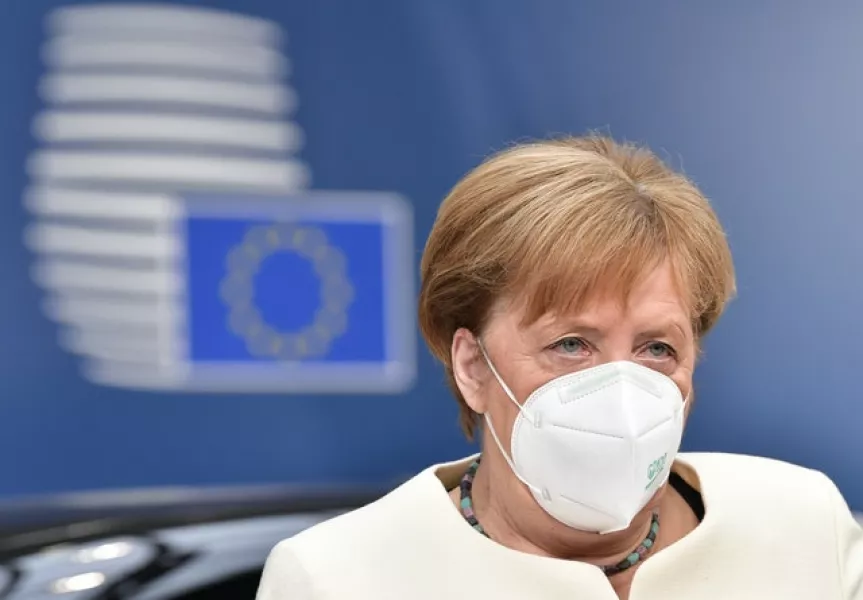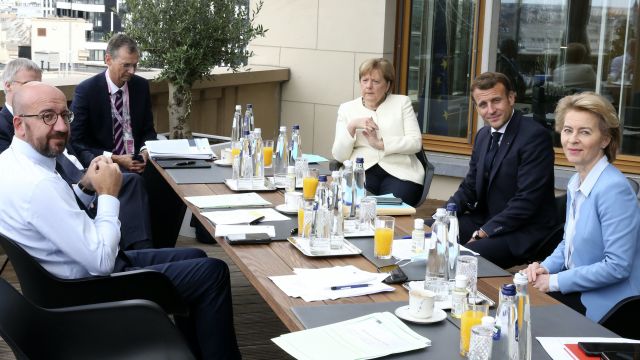And German chancellor Angela Merkel warned they might not reach a deal despite the urgency imposed by the pandemic.
Luxembourg prime minister Xavier Bettel said in his seven years’ experience of European meetings: “I have never seen positions as diametrically opposed as this.”

Even with Dr Merkel and French president Emmanuel Macron negotiating as the closest of partners, the traditionally all-powerful Franco-German alliance could not get the bloc’s 27 quarrelling nations in line.
Often negotiating outdoors on a sundeck in the Europa summit centre in Brussels, the blue skies and fresh breeze had no impact on the mood.
Undiplomatic terms like “hate” and “grumpy” have been thrown around between leaders during marathon negotiations that should have drawn everyone closer together to fight a historic recession in the bloc.
“Whether there will be a solution, I still can’t say,” Dr Merkel said as she arrived early for the extra day of talks.

The differences were so great that Sunday’s resumption of talks by all 27 leaders together was pushed back several hours almost to the evening as small groups worked on new compromise proposals.
The pandemic has sent the EU into a tailspin, killing around 135,000 of its citizens and sending its economy into an estimated contraction of 8.3% this year.
The bloc’s executive has proposed a €750 billion euro coronavirus fund, partly based on common borrowing, to be sent as loans and grants to the countries hit hardest by the pandemic.
That comes on top of the seven-year €1 trillion EU budget that leaders have been haggling over for months even before the pandemic hit.
All nations agree they need to band together but richer countries in the north, led by the Netherlands, want strict controls on spending, while struggling southern nations like Spain and Italy say those conditions should be kept to a minimum.

Dr Merkel and Mr Macron walked out of heated talks before dawn on Sunday with five nations nicknamed “the frugals”, bemoaning their lack of commitment to a common cause.
“They ran off in a bad mood,” Dutch prime minister Mark Rutte said after Dr Merkel and Mr Macron’s departure, calling the mood “grumpy”.
The so-called frugal nations held talks with EU summit host Charles Michel early on Sunday but the chances of quick progress appeared remote.
Dr Merkel and Mr Macron refused to water down their proposals of aid, while Mr Rutte and others also stuck to their demands.
Hungarian prime minister Viktor Orban raised the spectre of a second wave of Covid-19 that could hit EU economies hard.
“It is a decisive moment,” an EU official said.
“We are negotiating under the pressure that a deal is a must.”

Mr Rutte has long been known as a European bridge builder, but this weekend his tough negotiating stance is being blamed for holding up a deal.
He and his allies are pushing for labour market and pension reforms to be linked to EU handouts and a “brake” enabling EU nations to monitor and, if necessary, halt projects that are funded by the recovery fund.
While Italian prime minister Giuseppe Conte says he has a good personal relationship with Mr Rutte, he said the “clash is very hard” and that the Dutch politician’s demand for a veto “is an unwarranted request”.
Another of the so-called frugal nations, Austrian chancellor Sebastian Kurz, reportedly said he still believed a deal was possible, but that there was a “long way to go”.
Mr Rutte also wants a link to be made between the handout of EU funds and the rule of law — a connection clearly aimed at Poland and Hungary, countries with right-wing populist governments that many in the EU think are sliding away from democratic rule.
Mr Macron said leaders needed to compromise but still respect the underlying principles of the EU.







